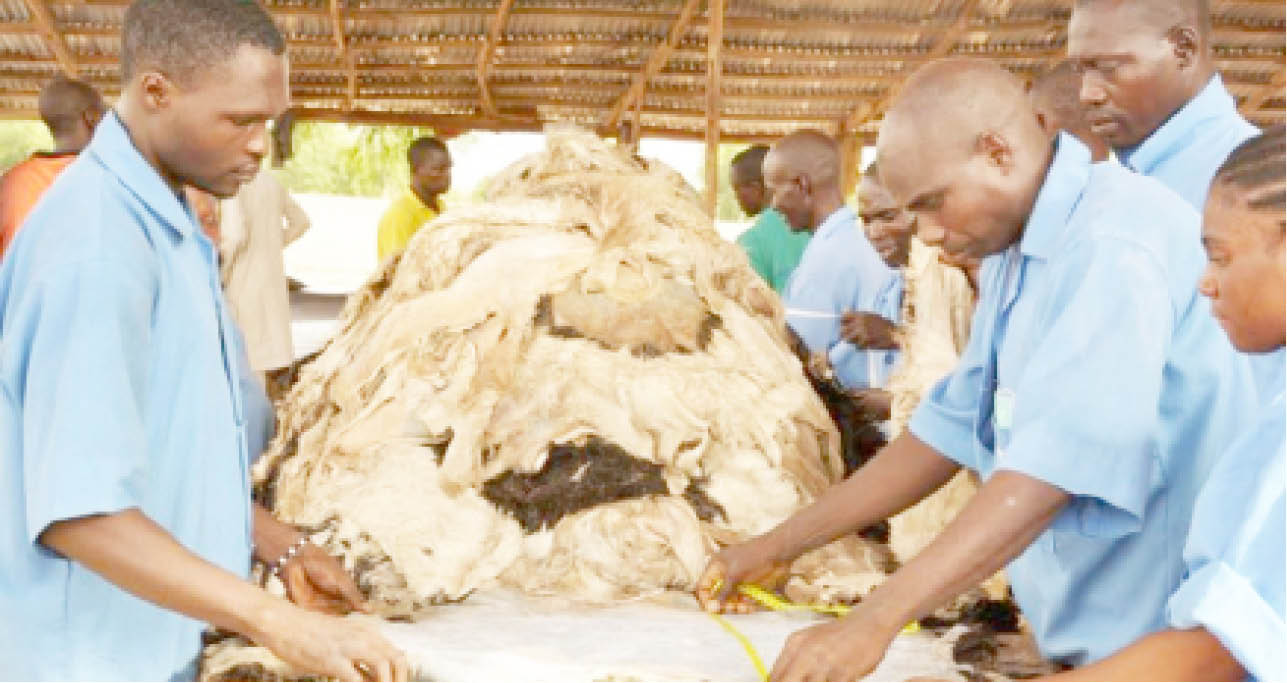Items made of leather tend to be very common in Nigerian homes. It could be the furniture in our parlours, the shoes and belts we wear, the bags we carry etc. Unlike before, made in Nigeria leather products are now being recognised and patronised by more Nigerians. Daily Trust Saturday takes a look at the leather market and how it has expanded over the years.
Nigeria is known to be one of the largest exporters of leather. The city of Kano is the largest trading centre for the leather industry in the country. The tanneries in Kano and Kaduna are swarmed with labour as men work on hides and skins for several brands all over the world. These traditional tanneries are the biggest local suppliers of leather, as well as the oldest in the country.
- Despite secessionist agitations, demands for new states flood constitution review panels
- Residents groan over collapsed bridge in Kogi
The Nigerian leather industry has grown beyond what anyone could have envisioned. The tanneries in the northern region are also known to supply leather to prominent designers, such as Louis Vuitton and Gucci. According to data from the Nigerian Export Promotion Council (NEPC), Italy and Spain are the largest import destinations of Nigerian leather, which covers a total of 71 per cent of exports. They deal mainly in goat leather, while sheep and lamb leather are of higher export value in Asian countries.
These traditional looking tanneries have laid the foundations to a profit-making industry. Not only is it profit-making, it has also been able to alleviate the citizens of that region from poverty by creating employment for its people. The tanneries are first ranked in the leather producing value chain, they collect hides and skin, apart from dead animals and take them through a process called tanning until they become leather.

Most cattle herders in Nigeria practise a free-range rearing system of cattle, sheep, goat etc. This helps in extending the toughness on the hides and skin, which in turn produces quality and long-lasting finished leather goods. Besides the regular cow and goat skin, they sometimes work on a range of peculiar skins like snakes.
Leathers gotten from theses factories are exported and used in the production of bags, shoes, belts and furniture. In 2016, it was disclosed that the French fashion designer, Louis Vuitton, patronised leather exported from northern Nigeria.
Adah Matthew is a skilled worker who has been into furniture making for a period of 12 years. He owns a furniture making company called Mattheco Interior Decoration and Furniture Limited in Abuja. Although most of his furniture are made from leather, he sometimes uses other fabric to design his work.
In an interview with Daily Trust, Matthew said growth in the leather market within years had been impeccable. He explained that for production of upholstery works, leather is always used.
Matthew buys his leather from the Dei-Dei building materials market and Kugbo furniture market, Abuja. According to him, in the market, leather has different prices and types – the low-quality leather goes for N1,500 per yard and the high-quality ones go for N8,000 per square meter.
“Whenever we have to use local leather for production, we always explain to our clients that local leather is not as long-lasting as the ones that have been refurbished and imported from other countries,” he said.
The local leather has a lasting period of one to two years while the refurbished type can last five to six years.
Compared to other materials used in production of furniture, he said leather was the cheapest material to work with. Because leather is cheap, and depending on how big one intends to start, venturing into the furniture making business is not financially draining, he added
Matthew revealed that there were different grades of machines used for leather works and production of items; therefore, one can afford to acquire what is within one’s capacity to kick-start a business plan. Matthew also explained that the cost of production when using leather, as compared to other materials, varies a lot because they are in different prices and quality.
For his furniture work, Matthew explained that because of the level of heat in Nigeria, he preferred to use refurbished leather from Italy and Turkey.
“Leather doesn’t like heat; and because of how hot Nigeria can be, most times we prefer using the refurbished leather in order to provide our clients with durable products. We always tell our clients that if they decide to use leather for their furniture, it must be kept in a cool place,” he said.
For a complete sofa set, Matthew charges nothing less than N400,000. The price varies, depending on the grade of materials used, design of the item and availability of materials. He also said most of his clients would go for leather as it conveys a look of maturity, originality, and is considered to be attractive.
Matthew also said that so far, his biggest challenge was the fact that in recent times, the market was flooded with low quality leather, and since he doesn’t have the financial means to import his materials, he is subjected to using what is available here. He, however, revealed that Nigerians were beginning to patronise Nigerian handmade leather furniture more than imported ones. He added that few times he repaired imported furniture for certain clients, they preferred his work to its original form.
Mbamalu Ogechukwu Emmanuella is another entrepreneur who patronises both Nigerian leather and refurbished ones for the production of shoes. Oge runs a female footwear brand called PerfetFeet in Lagos, Nigeria. She has been in the production business for a period of three years. She described her business as tough, especially since it is a male-dominated.
For her footwear, Oge mixes both Nigerian leather and refurbished ones to give her shoes a unique and appealing look. Most of her materials are gotten from Mushin market in Lagos. She uses different kinds of leather, including suede, nubuck, patent etc.
Oge said her shoe products were being more appreciated now than when she began her business. She added that a few of her clients had applauded her products, saying they are of better quality compared to what they got from foreign countries.
She also said she provided her clients with versatility as they are allowed to pick their own designs and colours.
Just like Matthew, Oge has also faced the challenge of dealing with inferior materials in the market and a price hike in leather. She revealed that because the prices of leather skyrocketed, she also had to readjust the sales price of her products.
She also expressed the need to hire more hands because the demand for handmade leather shoes is on the rise, and it takes her 10 working days to make one pair of shoes. A pair of mules from her brand goes between N8,000 and N9,000 depending on the design, while her flat slippers range between N6,000 and N7,000.
According to Oge, being a female entrepreneur in the production market is difficult because it is surrounded mostly with the male gender.
“From the beginning to the end of production, I am always communicating with men. The people I buy my materials from are men, so are the artisans and people making the shoes. However, I have been able to solidify my position in the business and command respect where it is needed,” she said.
The Nigerian leather market thus holds a lot of potential for the economy. If local producers were able to access machineries and steady supply of power, the industry can grow very big on a global scale.




